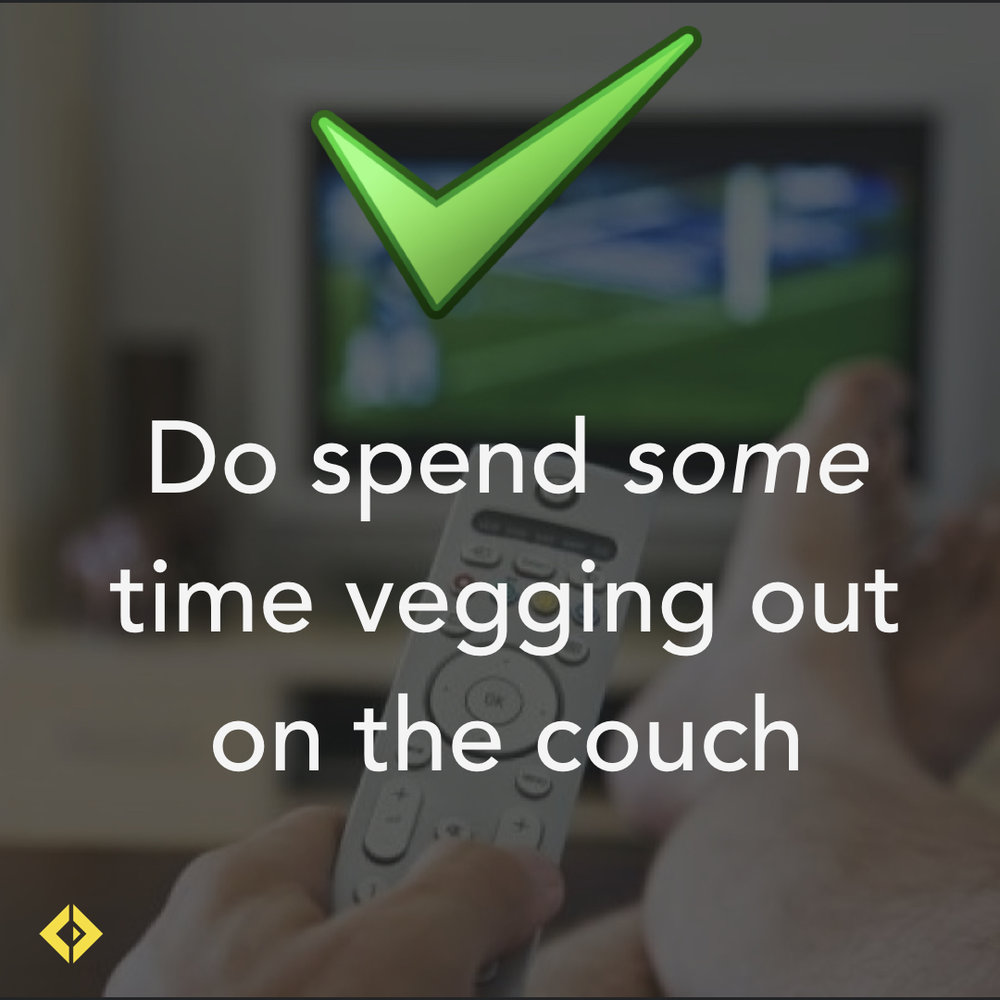
The holidays are here, and in Australia that means it's time for lazy beach days, sleep-ins, mountains of food and plenty of relaxing.
But if you overdo the bad stuff you can say goodbye to the last 48 weeks of awesome progress in the gym or on the field.
There are five common pitfalls with holiday training and nutrition for team sport athletes:
- Training like a distance runner
- Becoming a couch potato
- Doing zero strength maintenance
- Changing sleep habits
- Binge eating
Below I give simple actionable advice to help you successfully navigate the Christmas period. You should be able to have a great time, while also staying fit ready to attack next year.
1. Don't run kilometres if you compete in metres
"Hey, did you keep fit while you were away?"
"Yes coach, I went for a 5km run every day."
😭
Summer seems to be the time when everyone becomes a distance runner for some reason!
Team sports are built on strength, power and repeated high-intensity efforts, all of which require high levels of strength, reactivity and anaerobic conditioning. Too much long(400m+)* steady-state running can actually have a negative effect on your explosive power and strength, making you weaker and not all that much fitter. (AFL Football - and maybe rugby league - is the exception, these athletes can benefit from incorporating one weekly workout of longer interval repeat efforts).
If you play a chaotic ball or team sport that requires sprinting, cutting and jumping then you should do your best to mimic that work in your off-season. That’s why we invented Game Fit, a sports specific workout for athletes to do that challenges the muscle groups, movement patterns and fitness demands of power based sport like football, soccer, basketball, rugby, netball, volleyball and tennis.
During the holidays aim for 2-4 15-30 minute high-intensity workouts per week. That might be 2x Game Fit, 1x repeat sprints session, and 1x 8:12s session on a spin bike.
You can read more about sports specific fitness here
And find out how to do each of the workouts here:
Game Fit
Repeat Sprints
8:12s


2. Move every day, but relax too
The holidays and hot weather are a perfect time to get on the couch, blast the AC and binge on some Netflix, Playstation, or the cricket.
While we are all in favour of this (we will definitely be doing some of the above ourselves), neglecting to do something every day isn’t a very elite idea.
Aim to get up from the couch and at least walk around the house, have a quick stretch or do a few squats every hour (during the credits of each episode maybe?). Just aim to move in some way every day.
It could be a high-intensity workout like Game Fit, a home bodyweight strength routine, walking the dog, doing a full roll and stretch, or kicking the footy with friends. Whatever it is, make sure you get at least a bit of training or exercise (they are not the same thing) on a minimum of 6/7 days of the week.
These anti-desk routines are also perfect anti-couch solutions too.


3. Maintain some strength training
You worked hard for your progress in the gym, every ounce of strength you have accumulated this last eleven and a half months were hard fought and hard won.
The great tragedy of sports science is that those gains have zero loyalty. As soon as you go greater than seven days without strength training your muscles, tendons and nervous system begin to weaken.
Skip 14-21 days of strength training and you will have lost a huge chunk of the strength you built up over the year, we wish it weren’t true. But it is.
The good news is that while progress is tricky without bars, plates, and cable machines, it doesn’t take much to hold your ground and maintain your strength levels over the summer break. 2x 30-minute strength circuits can keep the majority of your body in good working order until you get back into a routine and can get back to the gym.
Try this circuit, complete 4 rounds of each exercise, doing the prescribed reps for each (rest only as needed):
- Squats x12
- Push Ups (kneeling if needed) x8-15
- Hip Thrust (shoulders on a chair/couch) x12
- Front plank x30s
- Side plank (both sides) x30s
- Single Leg RDL (Arabesque) x8 (each leg)
- Standing Calves x20-3
It's not perfect, but enough to stem a rapid decline in strength and power.



4. Don't become a night owl
Every human runs on what is called the circadian rhythm, an internal body clock which helps us fall asleep at night and wake back up in the morning.

There are two things that are interesting about this rhythm and both are very important when it comes to athletes (particularly teenage athletes) and holidays.
Teenagers tend to run in a slightly later rhythm
The reason teens can sleep all day and stay up all night is due to the fact that their natural circadian settings are slightly later than adults or children.
This is called a “sleep phase delay” and isn’t as dramatic as a teenager would have you believe. For most people the shift starts anywhere from 10-13 years old and is a change of about 1-2 hours, changing the typical time for sleepiness from 9 pm to 10/11pm. (But definitely not 1 am!)
Your circadian rhythm can be manipulated
While everybody lives in a certain rhythm for sleep and wake, it is possible to adjust or modify this rhythm based on habits and routines. Shift workers can train themselves to sleep during the day and teenagers can train themselves to sleep until 12 pm through poor holiday sleep habits.
In order to make the most of your restful holidays and not start the year more tired than when it finished, keep your sleep schedule as consistent as possible. That means your sleep and wake times should stay within 90 minutes of your normal routine.
If your regular weekly lights-out is 10pm, then holiday lights-out should be no later than 11 pm.
If your normal wake up is 7:30 am, then holiday wake up should be no later than 9 am (or maybe 9:30...)
Our article and videos about all things sleep can be found here


5. Eat whatever you want on Christmas (day)
Christmas Day is delicious. With all the relatives bringing all the desserts and the amazing mains, it’s easy to eat yourself into a food coma that can last until Boxing Day morning.
And you should.
Do it.
Eat until you burst.
But on Boxing Day you are back to normal(ish).
Frequently people have an indulgent Christmas Day and then decide that they will be healthy again starting from January 1st. One day of delicious indulgence won’t break the fitness bank for most people, but an entire week of bad eating sure will.
So enjoy Christmas, be merry, have an extra serving of dessert, but you should treat Boxing Day like most people do New Years Day.


